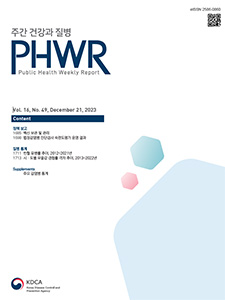Current Issue
Vol.16 No.49, December 21, 2023
-
Policy Notes 2023-12-21
 0
0
 675
675
 210
210
Vaccine Storage and Management
Minjeong Kim, Suyeon Jeong, KueYoung Lee, Sanggyun Jeong, Joonku Park
Public Health Weekly Report 2023; 16(49): 1685-1697 https://doi.org/10.56786/PHWR.2023.16.49.1 Abstract
AbstractProper storage and management of vaccines are crucial to ensure safe and effective vaccination. Vaccines that are stored outside the recommended temperature range can lose their potency, reducing the efficacy of the vaccines and leading to wasteful expenditure. Furthermore, mishandling vaccines can lead to inadequate and a low rate of vaccination and potentially increase the spread of infectious disease. Therefore, for a successful vaccination program, it is imperative to retain the efficacy vaccines by ensuring their optimal storage from production to inoculation. It is recommended that for better handling of vaccines, the institutions should designate a responsible individual for daily management and safekeeping of vaccines as per standardized storage protocols. The use of appropriate storage equipment, regular temperature checks with monitoring devices, and proper maintenance of the equipment are crucial components of this process. Moreover, managing vaccine expiration dates is a vital aspect of ensuring safe vaccination. The designated individual should diligently manage the vaccine inventory from the moment of receipt until its usage or disposal. Moreover, managing vaccine expiration dates is a vital aspect of ensuring safe vaccination. Further, contingency plans should be prepared and backup storage equipment should be made available for rapid response during emergency. In this article, we will delve into the principles of vaccine storage and handling that are essential for safe and effective vaccination.
-
Policy Notes 2023-12-21
 1
1
 377
377
 100
100
Results of the Proficiency Test for Diagnostic Testing of Notifiable Infectious Diseases
Ok-Kyu Park, Seung Geun Lee, Jae Sun Park, Gab Jung Kim
Public Health Weekly Report 2023; 16(49): 1698-1710 https://doi.org/10.56786/PHWR.2023.16.49.2 Abstract
AbstractWhen an infectious disease arises, prompt and accurate identification of the causative pathogen through diagnostic tests becomes crucial. The Korea Disease Control and Prevention Agency (KDCA) operates a proficiency testing program for diagnostic tests of notifiable infectious diseases. This program is designed to ensure the accuracy and reliability of national infectious disease diagnostic tests. Proficiency tests evaluate the ability of participating institutions to conduct inspections using pre-established inspection criteria and trained inspectors. It also evaluates and verifies the inspection's accuracy using substances similar to the samples. At the beginning of each year, a proficiency test plan is established for diagnostic tests of infectious diseases, and evaluations are conducted accordingly. The notifiable infectious disease proficiency test conducted by the KDCA from April 2022 to the end of February 2023 consisted of a total of 30 programs and included 95 test methods for 79 infectious diseases. About 910 institutions participated in the evaluation, including 286 public and 630 private medical institutions. Public institutions operated the majority of the 30 programs. As a result of the proficiency tests, the average pass rate for all participating institutions was 98.3%. This pass rate was consistent for both public and private institutions, with each achieving a pass rate of 98.3%. The KDCA plans to continue its efforts to improve the accuracy and reliability of diagnostic tests by managing the quality of tests for infectious diseases through the operation of a notifiable infectious disease proficiency test.
-
QuickStats 2023-12-21
 0
0
 158
158
 155
155
Trends in the Prevalence of Anemia, 2012–2021
Public Health Weekly Report 2023; 16(49): 1711-1712 https://doi.org/10.56786/PHWR.2023.16.49.3
-
QuickStats 2023-12-21
 0
0
 147
147
 144
144
Trends in the Prevalance Gap of Perceived Depressive Symptoms between Cities or Provinces, during 2013–2022
Public Health Weekly Report 2023; 16(49): 1713-1714 https://doi.org/10.56786/PHWR.2023.16.49.4

pp. 233~285
Most Keyword
?
What is Most Keyword?
- It is the most frequently used keyword in articles in this journal for the past two years.
Most Read
-
Management of Technology Development Efforts to Enhance the Healthcare Establishment’s Infection Response Capabilities
Misuk An, Hyeyoung Lee, Se-Jin Jeong, Hojin Lee, Sunkyung Baek
Public Health Weekly Report 2026;19: 1-12 https://doi.org/10.56786/PHWR.2026.19.1.1 -
Status and Future Tasks of the Regional Infectious Disease Specialized Hospital Establishment Project for Responding to Large-scale Emerging Infectious Disease Crises
Jeong-won Yeom, Hae-won Cho, Ju-hong Kim, Jong-hee Choi
Public Health Weekly Report 2026;19: 13-28 https://doi.org/10.56786/PHWR.2026.19.1.2
Editorial Office
+82-43-719-7569





 Full Text
Full Text Cite
Cite


